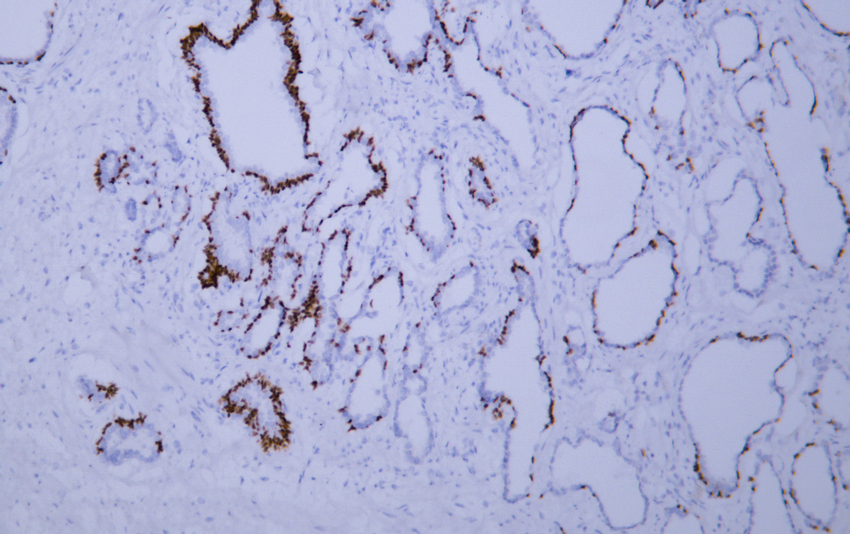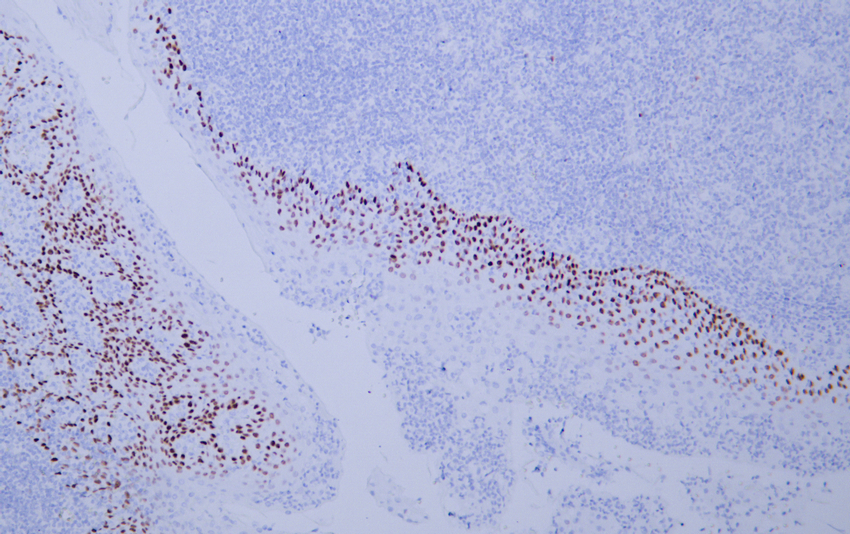p63 (ABT-P63) mouse mAb (Ready to Use)
- Catalog No.:YM6207R
- Applications:IHC
- Reactivity:Human;Mouse;Rat;
- Target:
- p40/p63
- Fields:
- >>MicroRNAs in cancer
- Gene Name:
- TP63 KET P63 P73H P73L TP73L
- Protein Name:
- Tumor protein 63 (p63) (Chronic ulcerative stomatitis protein) (CUSP) (Keratinocyte transcription factor KET) (Transformation-related protein 63) (TP63) (Tumor protein p73-like) (p73L) (p40) (p51)
- Human Gene Id:
- 8626
- Human Swiss Prot No:
- Q9H3D4
- Immunogen:
- Synthesized peptide derived from human p63 AA range: 600-680
- Specificity:
- The antibody can specifically recognize human p63 protein, including ΔNp63 and TAp63.
- Formulation:
- The prediluted ready-to-use antibody is diluted in phosphate buffer saline containing stabilizing protein and 0.05% Proclin 300
- Source:
- Mouse, Monoclonal/IgG1, kappa
- Dilution:
- Ready to use for IHC
- Purification:
- The antibody was affinity-purified from ascites by affinity-chromatography using specific immunogen.
- Storage Stability:
- 2°C to 8°C/1 year
- Background:
- tumor protein p63(TP63) Homo sapiens This gene encodes a member of the p53 family of transcription factors. The functional domains of p53 family proteins include an N-terminal transactivation domain, a central DNA-binding domain and an oligomerization domain. Alternative splicing of this gene and the use of alternative promoters results in multiple transcript variants encoding different isoforms that vary in their functional properties. These isoforms function during skin development and maintenance, adult stem/progenitor cell regulation, heart development and premature aging. Some isoforms have been found to protect the germline by eliminating oocytes or testicular germ cells that have suffered DNA damage. Mutations in this gene are associated with ectodermal dysplasia, and cleft lip/palate syndrome 3 (EEC3); split-hand/foot malformation 4 (SHFM4); ankyloblepharon-ectodermal defects-cleft lip/palate; ADULT syndrome (acro-dermato-ungual-lacrim
- Function:
- cofactor:Binds 1 zinc ion per subunit.,disease:Defects in TP63 are a cause of cervical, colon, head and neck, lung and ovarian cancers.,disease:Defects in TP63 are a cause of ectodermal dysplasia Rapp-Hodgkin type (EDRH) [MIM:129400]; also called Rapp-Hodgkin syndrome or anhidrotic ectodermal dysplasia with cleft lip/palate. Ectodermal dysplasia defines a heterogeneous group of disorders due to abnormal development of two or more ectodermal structures. EDRH is characterized by the combination of anhidrotic ectodermal dysplasia, cleft lip, and cleft palate. The clinical syndrome is comprised of a characteristic facies (narrow nose and small mouth), wiry, slow-growing, and uncombable hair, sparse eyelashes and eyebrows, obstructed lacrimal puncta/epiphora, bilateral stenosis of external auditory canals, microsomia, hypodontia, cone-shaped incisors, enamel hypoplasia, dystrophic nails, and
- Subcellular Location:
- Nuclear
- Expression:
- Widely expressed, notably in heart, kidney, placenta, prostate, skeletal muscle, testis and thymus, although the precise isoform varies according to tissue type. Progenitor cell layers of skin, breast, eye and prostate express high levels of DeltaN-type isoforms. Isoform 10 is predominantly expressed in skin squamous cell carcinomas, but not in normal skin tissues.
- June 19-2018
- WESTERN IMMUNOBLOTTING PROTOCOL
- June 19-2018
- IMMUNOHISTOCHEMISTRY-PARAFFIN PROTOCOL
- June 19-2018
- IMMUNOFLUORESCENCE PROTOCOL
- September 08-2020
- FLOW-CYTOMEYRT-PROTOCOL
- May 20-2022
- Cell-Based ELISA│解您多样本WB检测之困扰
- July 13-2018
- CELL-BASED-ELISA-PROTOCOL-FOR-ACETYL-PROTEIN
- July 13-2018
- CELL-BASED-ELISA-PROTOCOL-FOR-PHOSPHO-PROTEIN
- July 13-2018
- Antibody-FAQs
- Products Images

- Human breast carcinoma tissue was stained with Anti-p63 (ABT-P63) Antibody

- Human prostate tissue was stained with Anti-p63 (ABT-P63) Antibody

- Human tonsil tissue was stained with Anti-p63 (ABT-P63) Antibody



